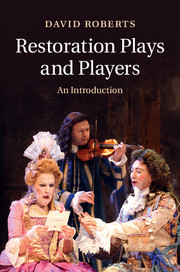1 - Regime change theatre
Published online by Cambridge University Press: 05 November 2014
Summary
A little before one o’clock in the afternoon two men play cards over that relatively novel luxury, hot chocolate. A servant hovers. The game finishes, they get up, and the loser ventures a comment:
You are a fortunate man, Mr Fainall.
Until the name, it could be a routine quip (lucky!). But it’s hard to feign all and be thought entirely honest, even at cards. Perhaps used to such banter, Fainall only expresses surprise that the game is done, with a dose of frustration that his companion has been playing ‘negligently’. A walkover, it seems, is unsatisfying; he wants to play hard.
By normal standards this Fainall, though competitive, looks the more engaging of the two; the other man is evidently ‘reserved’, ‘out of humour’, needing to be coaxed into companionship. What’s troubling him, it turns out, is an affair of the heart: a quarrel with the heiress he’s in love with, Millamant (her name says she has a thousand other options), and her meddlesome aunt, Lady Wishfort (hers needs no explanation). The discovery underlines the emerging difference between the two card players: one skims across the surface of conversation, the other broods on what lies beneath. Audiences may be aurprised to find, nearly a hundred lines in, that the moody man’s own name shimmers with success. He may lose to a fortunate Mr Fainall, but ‘Mirabell’ assures him of his ultimate reward.
- Type
- Chapter
- Information
- Restoration Plays and PlayersAn Introduction, pp. 1 - 28Publisher: Cambridge University PressPrint publication year: 2014



